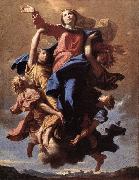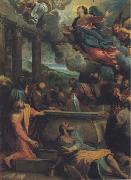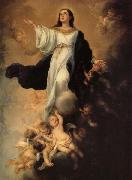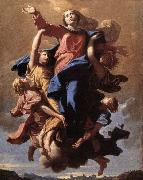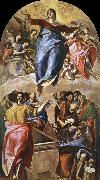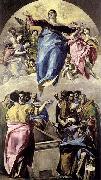Wholesale Oil Painting No Minimum |
|||||||||||
|
|
|||||||||||

|
|||||||||||
|
|
|
||||||||
Nicolas PoussinFrench 1594-1665 Nicolas Poussin Galleries The finest collection of Poussin's paintings, in addition to his drawings, is located in the Louvre in Paris. Besides the pictures in the National Gallery and at Dulwich, England possesses several of his most considerable works: The Triumph of Pan is at Basildon House, near to Pangbourne, (Berkshire), and his great allegorical painting of the Arts at Knowsley. The later version of Tancred and Erminia is at the Barber Institute in Birmingham. At Rome, in the Colonna and Valentini Palaces, are notable works by him, and one of the private apartments of Prince Doria is decorated by a great series of landscapes in distemper. Throughout his life he stood aloof from the popular movement of his native school. French art in his day was purely decorative, but in Poussin we find a survival of the impulses of the Renaissance coupled with conscious reference to classic work as the standard of excellence. In general we see his paintings at a great disadvantage: for the color, even of the best preserved, has changed in parts, so that the harmony is disturbed; and the noble construction of his designs can be better seen in engravings than in the original. Among the many who have reproduced his works, Audran, Claudine Stella, Picart and Pesne are the most successful. |
||||||||
|
|
||||||||
The Assumption of the Virgin
The Assumption of the Virgin Painting ID:: 10124 |
1650
Oil on canvas
57 x 40 cmLouvre 1650 Oil on canvas 57 x 40 cmLouvre |
|||||||
|
|
||||||||
Annibale Carracci1560-1609 Italian Annibale Carracci Locations Painter, draughtsman and printmaker, brother of (2) Agostino Carracci. Since his lifetime, he has been considered one of the greatest Italian painters of his age. His masterpiece, the ceiling (1597-1601) of the Galleria Farnese, Rome, merges a vibrant naturalism with the formal language of classicism in a grand and monumental style. Annibale was also instrumental in evolving the ideal, classical landscape and is generally credited with the invention of CARICATURE. |
||||||||
|
|
||||||||
|
|
The Assumption of the Virgin
The Assumption of the Virgin Painting ID:: 28089 |
mk61
c.1590
Oil on canvas
130x97cm
mk61 c.1590 Oil on canvas 130x97cm |
||||||
|
|
||||||||
Bartolome Esteban MurilloSpanish 1618-1682 Bartolome Esteban Murillo Galleries Murillo began his art studies under Juan del Castillo in Seville. Murillo became familiar with Flemish painting; the great commercial importance of Seville at the time ensured that he was also subject to influences from other regions. His first works were influenced by Zurbaran, Jusepe de Ribera and Alonso Cano, and he shared their strongly realist approach. As his painting developed, his more important works evolved towards the polished style that suited the bourgeois and aristocratic tastes of the time, demonstrated especially in his Roman Catholic religious works. In 1642, at the age of 26 he moved to Madrid, where he most likely became familiar with the work of Velazquez, and would have seen the work of Venetian and Flemish masters in the royal collections; the rich colors and softly modeled forms of his subsequent work suggest these influences. He returned to Seville in 1645. In that year, he painted thirteen canvases for the monastery of St. Francisco el Grande in Seville which gave his reputation a well-deserved boost. Following the completion of a pair of pictures for the Seville Cathedral, he began to specialise in the themes that brought him his greatest successes, the Virgin and Child, and the Immaculate Conception. After another period in Madrid, from 1658 to 1660, he returned to Seville. Here he was one of the founders of the Academia de Bellas Artes (Academy of Art), sharing its direction, in 1660, with the architect, Francisco Herrera the Younger. This was his period of greatest activity, and he received numerous important commissions, among them the altarpieces for the Augustinian monastery, the paintings for Santa Mar??a la Blanca (completed in 1665), and others. |
||||||||
|
|
||||||||
|
|
The Assumption of the Virgin
The Assumption of the Virgin Painting ID:: 29187 |
mk65
1670s
Oil on canvas
77x57"
mk65 1670s Oil on canvas 77x57" |
||||||
|
|
||||||||
Matteo Di GiovanniItalian Early Renaissance Painter, ca.1430-1495 |
||||||||
|
|
||||||||
|
|
The Assumption of the Virgin
The Assumption of the Virgin Painting ID:: 42864 |
mk170
circa 1474
Tempera on wood
331.5x174cm
mk170 circa 1474 Tempera on wood 331.5x174cm |
||||||
|
|
||||||||
POUSSIN, NicolasFrench Baroque Era Painter, 1594-1665 French painter and draughtsman, active in Italy. His supreme achievement as a painter lies in his unrivalled but hard-won capacity to subordinate dramatic narrative and the expression of extreme states of human passions to the formal harmony of designs based on the beauty and precision of abstract forms. The development of his art towards this end was focused on the search for a point of equilibrium and synthesis between the forces of the Classical and the Baroque around which most critical debate in Rome was concentrated during the 1630s. Poussin did not aspire to the classicism of Raphael's idealized human forms or Michelangelo's re-embodiment of the physical splendours of the antique world, nor did he attempt to vie with the bravura and energy of Annibale Carracci's treatment of Classical mythology in the Galleria of the Palazzo Farnese in Rome. Equally he was not concerned with the illusionistic effects and heightened emotionalism of Baroque artists such as Pietro da Cortona and Lanfranco. He was concerned above all with interpreting his subject-matter, whether Classical or religious, and telling a story with the greatest possible concentration of emotional response, |
||||||||
|
|
||||||||
|
|
The Assumption of the Virgin
The Assumption of the Virgin Painting ID:: 51235 |
1650
Oil on canvas,
57 x 40 cm 1650 Oil on canvas, 57 x 40 cm |
||||||
|
|
||||||||
El GrecoGreek-born Spanish Mannerist Painter, 1541-1614 Considered a representative of late Renaissance Spanish art, El Greco was actually born in Greece, on the island of Crete. After studying in Venice under Titian, El Greco settled in Toledo, Spain in 1577. At the time he was wildly popular, his emotionally religious paintings being just the ticket for the hometown of the Spanish Inquisition. After his death his work was largely ignored until the beginning of the 20th century; now he considered one of the inspired geniuses of Western art. His distinctive style features bold shapes and colors, with elongated and slightly distorted figures. In Toledo El Greco was in constant demand and liked living large: he maintained a private orchestra to accompany his meals. |
||||||||
|
|
||||||||
|
|
The Assumption of the Virgin
The Assumption of the Virgin Painting ID:: 53569 |
mk233
1577
Oil on canvas
401x229cm
mk233 1577 Oil on canvas 401x229cm |
||||||
|
|
||||||||
El GrecoGreek-born Spanish Mannerist Painter, 1541-1614 Considered a representative of late Renaissance Spanish art, El Greco was actually born in Greece, on the island of Crete. After studying in Venice under Titian, El Greco settled in Toledo, Spain in 1577. At the time he was wildly popular, his emotionally religious paintings being just the ticket for the hometown of the Spanish Inquisition. After his death his work was largely ignored until the beginning of the 20th century; now he considered one of the inspired geniuses of Western art. His distinctive style features bold shapes and colors, with elongated and slightly distorted figures. In Toledo El Greco was in constant demand and liked living large: he maintained a private orchestra to accompany his meals. |
||||||||
|
|
||||||||
|
|
The Assumption of the Virgin
The Assumption of the Virgin Painting ID:: 59156 |
The Assumption of the Virgin (1577?C1579, oil on canvas, 401 ?? 228 cm, Art Institute of Chicago) was one of the nine paintings El Greco completed for the church of Santo Domingo el Antiguo in Toledo, his first commission in Spain. The Assumption of the Virgin (1577?C1579, oil on canvas, 401 ?? 228 cm, Art Institute of Chicago) was one of the nine paintings El Greco completed for the church of Santo Domingo el Antiguo in Toledo, his first commission in Spain. |
||||||
|
|
||||||||
|
El Greco Greek-born Spanish Mannerist Painter, 1541-1614 Considered a representative of late Renaissance Spanish art, El Greco was actually born in Greece, on the island of Crete. After studying in Venice under Titian, El Greco settled in Toledo, Spain in 1577. At the time he was wildly popular, his emotionally religious paintings being just the ticket for the hometown of the Spanish Inquisition. After his death his work was largely ignored until the beginning of the 20th century; now he considered one of the inspired geniuses of Western art. His distinctive style features bold shapes and colors, with elongated and slightly distorted figures. In Toledo El Greco was in constant demand and liked living large: he maintained a private orchestra to accompany his meals. The Assumption of the Virgin The Assumption of the Virgin (1577?C1579, oil on canvas, 401 ?? 228 cm, Art Institute of Chicago) was one of the nine paintings El Greco completed for the church of Santo Domingo el Antiguo in Toledo, his first commission in Spain. |
||||||||
|
|
||||||||
|
Prev Next
|
||||||||
|
|
||||||||
|
Related Paintings to El Greco :. |
||||||||
|
|
||||||||
|
CONTACT US |
